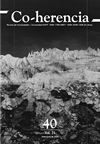Considerations About a Good Life Under the Scope of Academic Productivism
Main Article Content
Keywords
Academic life, academic productivism, craftsmanship, enjoyment, good life, resonance
Abstract
In this article we intend to participate in the problematization of academic productivism and the proposal of a good life in the academy. We understand academic productivism as an orientation of academic work given by the valuation of limited profitability and tangible results thereof; and the good life in the academy as a state of balance between the forces and needs of those who compose it, a balance available to be constantly updated. We start from the different damages that academic productivism entails, regarding which we present a proposal to favor the good life in the academy, where we return to the perspectives of various authors who focus on elements such as: good craftsmanship, enjoyment, the resonance and care of oneself, of others and of the world.
Downloads
References
Becerril-García, A., Aguado-López, E., Batthyány, K., Melero, R., Beigel, F., Vélez Cuartas, G., Banzato, G., Rozemblum, C., Amescua García, C., Gallardo, O. y Torres, J. (2018). AmeliCA: una estructura sostenible e impulsada por la comunidad para el conocimiento abierto en América Latina y el Sur Global. Redalyc, Universidad Autónoma del Estado de México, Clacso, Universidad Nacional de La Plata, Universidad de Antioquia. https://goo.su/jQZsG7x
Beck, U. (1998). La sociedad del riesgo. Hacia una nueva modernidad (J. Navarro, D. Jiménez y M.a Borrás, Trads.). Paidós.
Bedoya Hernández, M. (2018). La gestión de sí mismo. Ética y subjetivación en el neoliberalismo. Universidad de Antioquia.
Beigel, F. (2018). Las relaciones de poder en la ciencia mundial. Un antiranking para conocer la ciencia producida en la periferia. Nueva Sociedad, (274), 13-28. https://goo.su/EHe5V
Berg, M. y Seeber, B. K. (2022). The Slow Professor. Desafiando la cultura de la rapidez en la academia (B. Jiménez Villar, Trad.). Universidad de Granada.
Foucault, M. (2000). La ética del cuidado de sí como práctica de la libertad (diálogo con H. Becker, R. Fornet-Betancourt, A. Gómez-Müller, 20 de enero de 1984). Nombres, (15), 257-280. https://goo.su/7YiBann
Foucault, M. (2003). La hermenéutica del sujeto. Curso en el Collège de France (1981-1982) (F. Álvarez Uría, Ed. y Trad.). FCE.
Fredrickson, B. L. (2001). The role of positive emotions in positive psychology: The broaden-and-build theory of positive emotions. American Psychologist, 56(3), 218-226. https://doi.org/10.1037%2F%2F0003-066x.56.3.218
Frisch, J. K., & Saunders, G. (2008). Using stories in an introductory college biology course. Journal of Biological Education, 42(4), 164-169. https://doi.org/10.1080/00219266.2008.9656135
Lanz, C. (2012). El cuidado de sí y del otro en lo educativo. Utopía y Praxis Latinoamericana, 17(56), 39-46. https://n9.cl/4yb0f
Manrique Tisnés, H. y De Castro Correa, A. (2016). Realidad, teoría y conmensurabilidad: reflexiones en torno a las modas intelectuales en psicología. CES Psicología, 9(1), 65-88. http://dx.doi.org/10.21615/cesp.9.1.5
Mills, C. W. (2009). Sobre artesanía intelectual. Trabajo y sociedad, 12(13), 1-18. https://n9.cl/wng2r
Orrego Zuluaga, X. (2023). Procesos subjetivos de los estudiantes doctorales en el contexto del productivismo académico. [Tesis Doctoral en Ciencias Humanas y Sociales, Universidad Nacional de Colombia-Sede Medellín].
Panksepp, J. (2000). The Riddle of Laughter: Neural and Psychoevolutionary Underpinnings of Joy. Current Directions in Psychological Science, 9(6), 183-186. https://doi.org/10.1111/1467-8721.00090
Picard, R. W., Papert, S., Bender, W., Blumberg, B., Breazeal, C., Cavallo, D., & Strohecker, C. (2004). Affective learning – a manifesto. BT Technology Journal, 22(4), 253-269. https://goo.su/SpIdV
Pineda, N. (2023). De la aguja a la máquina: oficio, técnica y formación de los obreros textiles durante la industrialización antioqueña. Facultad de Ciencias Humanas y Económicas, Universidad Nacional de Colombia.
Rosa, H. (2016). Alienación y aceleración. Hacia una teoría crítica de la temporalidad en la modernidad tardía (ciihh-unam, Trad., E. Dávila y M. Aguiluz, Revisión y notas). Katz.
Rosa, H. (2019). Resonancia. Una sociología de la relación con el mundo (A. Gros, Trad.). Katz.
Ruiz García, M. (2006). Ethos de la formación universitaria y otros ensayos hermenéuticos. Universidad Pontificia Bolivariana y Universidad Nacional de Colombia.
Sandel, M. J. (2020). La Tiranía del Mérito. ¿Qué ha sido del bien común? (A. Santos Mosquera, Trad.). Debate.
Sennett, R. (2009). El artesano (M. Aurelio Galmarini, Trad.). Anagrama.
Sennett, R. (2013). Juntos. Rituales, placeres y política de cooperación (M. A. Galmarini, Trad.). Anagrama.
Simondon, G. (2007). El modo de existencia de los objetos técnicos (M. Martínez y P. Rodríguez, Trads.). Prometeo Libros.
Vera Martínez, H. (2018). Los cuatro jinetes de la evaluación: productivismo, reduccionismo, cuantofrenia y simulación. Revista de la Educación Superior, 47(187), 25-48. https://goo.su/u0nbiz





